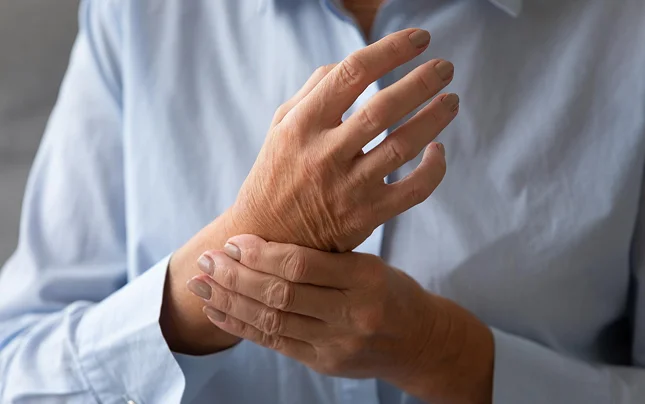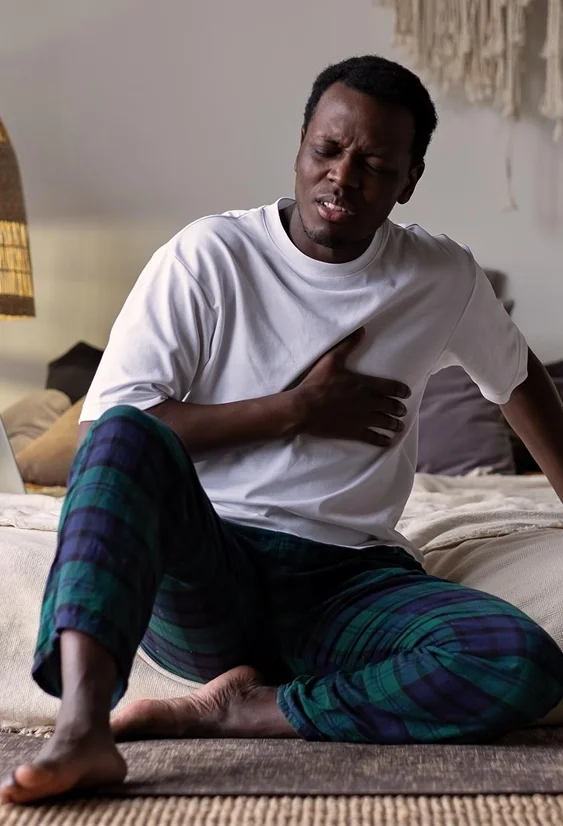Ehlers-Danlos Syndrome (EDS), Postural Orthostatic Tachycardia Syndrome (POTS), and Mast Cell Activation Syndrome (MCAS)

At Beyond Basics, we specialize in treating complex cases with a focus on the whole person, not just isolated symptoms. Some patients come to us with a single diagnosis, while others face the overlap of what’s often called the “trifecta.” Each condition brings its own challenges, but when they occur together, symptoms can compound in ways that affect every part of life.
Common Symptoms and Challenges of EDS, POTS, and MCAS
At Beyond Basics, we understand how discouraging it can be to live with symptoms that don’t always make sense or that get overlooked by providers. That’s why we take the time to break down each condition, explain how it can present, and design care that adapts to your body’s needs.


Ehlers-Danlos Syndrome (EDS)
- Joint hypermobility, sprains, or dislocations
- Chronic musculoskeletal pain
- Fatigue from overworked muscles
- Skin fragility, easy bruising
- Pelvic floor issues such as prolapse, incontinence, or pelvic pain
Postural Orthostatic Tachycardia Syndrome (POTS)
- Rapid heart rate and dizziness upon standing
- Fainting or “near fainting” spells
- Exercise intolerance and chronic fatigue
- Brain fog or difficulty concentrating
- Digestive discomfort (bloating, nausea, abdominal pain)
Mast Cell Activation Syndrome (MCAS)
- Flushing, hives, or swelling
- GI upset such as cramping, diarrhea, or reflux
- Wheezing or throat tightness
- Sensitivities to foods, medications, or environmental triggers
- Sudden systemic flare-ups or anaphylaxis-like episodes
Living with the EDS, POTS, and MCAS Trifecta
For many patients, this overlap creates a cycle that impacts nearly every part of life. You may find yourself:
- Struggling with pain and joint instability that limit mobility
- Experiencing dizziness, brain fog, or fatigue that interrupts work, school, or social life
- Managing unpredictable allergic-type reactions or sensitivities that make planning difficult
- Dealing with pelvic floor issues like incontinence or pain that add another layer of stress
- Feeling anxious, isolated, or dismissed after years of searching for answers

How Physical Therapy Helps with EDS, POTS, and MCAS
At Beyond Basics, our physical therapists don’t just focus on isolated problems. We look at how your joints, muscles, circulation, and nervous system all work together, tailoring treatment to your body’s unique needs. Our goal is to help you manage flare-ups, move with less pain, and return to the daily activities that matter most to you.
- Orthopedic Physical Therapy
- Pelvic Floor Physical Therapy
- Autonomic & Systemic Support
- Education & Empowerment
- Emotional & Lifestyle Support
Orthopedic Physical Therapy
- Stabilization exercises for hypermobile joints
- Gentle manual therapy for alignment and pain relief
- Strength and neuromuscular training for safer movement patterns
- Postural retraining to reduce strain on joints and tissues
- Balance and coordination training to prevent falls or injury
- Guidance on safe return to exercise, sports, or daily activities
Pelvic Floor Physical Therapy
- Relief for pelvic pain, prolapse, or incontinence
- Breathing and core coordination to improve stability
- Gentle hands-on techniques adapted to sensitive tissues
- Support for pregnancy and postpartum recovery in hypermobile patients
- Bladder and bowel retraining strategies for better control
- Education on posture, lifting, and daily habits that protect the pelvic floor
Autonomic & Systemic Support
- Pacing, breathing, and graded activity strategies for POTS
- Education and flare-up management tools for MCAS
- Energy conservation strategies for fatigue
- Lifestyle and functional strategies to support whole-body balance
- Compression, hydration, and positional strategies for circulatory support
- Gentle conditioning to improve activity tolerance without overexertion
Education & Empowerment
- Guidance on safe daily movement and body mechanics
- Self-management strategies for flare-ups and symptom cycles
- Tools to build confidence and independence in managing your condition
- Individualized home exercise programs to extend progress beyond the clinic
- Resources for navigating conversations with other providers or caregivers
Emotional & Lifestyle Support
- Validation that your symptoms are real and deserve care
- Stress management techniques integrated into treatment
- Focus on returning to meaningful activities — from exercise to hobbies
- Supportive strategies for traveling, working, and socializing with less fear of flare-ups
- Encouragement and guidance to rebuild trust in your body over time
How Physical Therapy Helps with EDS, POTS, and MCAS
When you’re living with conditions like EDS, POTS, or MCAS, your symptoms are often unpredictable. One day you might feel almost yourself, and the next, pain, fatigue, dizziness, or flare-ups can stop you in your tracks. That uncertainty can be frustrating and isolating — but physical therapy can help you regain some balance and consistency in daily life.
At Beyond Basics, our physical therapists don’t just focus on isolated problems. We look at how your joints, muscles, circulation, and nervous system all work together, tailoring treatment to your body’s unique needs. Our goal is to help you manage flare-ups, move with less pain, and return to the daily activities that matter most to you.
Orthopedic Physical Therapy
- Stabilization exercises for hypermobile joints
- Gentle manual therapy for alignment and pain relief
- Strength and neuromuscular training for safer movement patterns
- Postural retraining to reduce strain on joints and tissues
- Balance and coordination training to prevent falls or injury
- Guidance on safe return to exercise, sports, or daily activities
Pelvic Floor Physical Therapy
- Relief for pelvic pain, prolapse, or incontinence
- Breathing and core coordination to improve stability
- Gentle hands-on techniques adapted to sensitive tissues
- Support for pregnancy and postpartum recovery in hypermobile patients
- Bladder and bowel retraining strategies for better control
- Education on posture, lifting, and daily habits that protect the pelvic floor
Autonomic & Systemic Support
- Pacing, breathing, and graded activity strategies for POTS
- Education and flare-up management tools for MCAS
- Energy conservation strategies for fatigue
- Lifestyle and functional strategies to support whole-body balance
- Compression, hydration, and positional strategies for circulatory support
- Gentle conditioning to improve activity tolerance without overexertion
Education & Empowerment
- Guidance on safe daily movement and body mechanics
- Self-management strategies for flare-ups and symptom cycles
- Tools to build confidence and independence in managing your condition
- Individualized home exercise programs to extend progress beyond the clinic
- Resources for navigating conversations with other providers or caregivers
Emotional & Lifestyle Support
- Validation that your symptoms are real and deserve care
- Stress management techniques integrated into treatment
- Focus on returning to meaningful activities — from exercise to hobbies
- Supportive strategies for traveling, working, and socializing with less fear of flare-ups
- Encouragement and guidance to rebuild trust in your body over time
Why Choose Beyond Basics for EDS, POTS, and MCAS Care
- 60 minute, one-on-one sessions with your physical therapist
We never rush your care. Each appointment is a full hour with a licensed physical therapist, giving us the time to listen, evaluate, and provide thorough treatment. - Dual expertise in both orthopedic and pelvic floor therapy
Many clinics focus on just one specialty. Our team combines both, allowing us to address musculoskeletal pain, instability, and pelvic floor dysfunction together. - Specialized autonomic and systemic support
We understand how chronic conditions affect your daily function. Our physical therapists incorporate pacing, breathing, and flare-up management strategies into your treatment. - Experience with complex conditions that many clinics overlook
Patients often come to us after years of feeling dismissed. We routinely treat rare and overlapping diagnoses, validate your experience, and create a plan that fits your needs. - Collaborative care with your broader medical team
We collaborate closely with specialists such as rheumatologists, cardiologists, immunologists, OB/GYNs, gastroenterologists, primary care physicians, neurologists, endocrinologists, urologists, pain specialists, and mental health providers. - Whole-person approach that focuses on function, confidence, and quality of life — not just symptoms
Our goal isn’t just reducing pain or managing flare-ups; we help you rebuild trust in your body and return to the activities that matter most to you.


